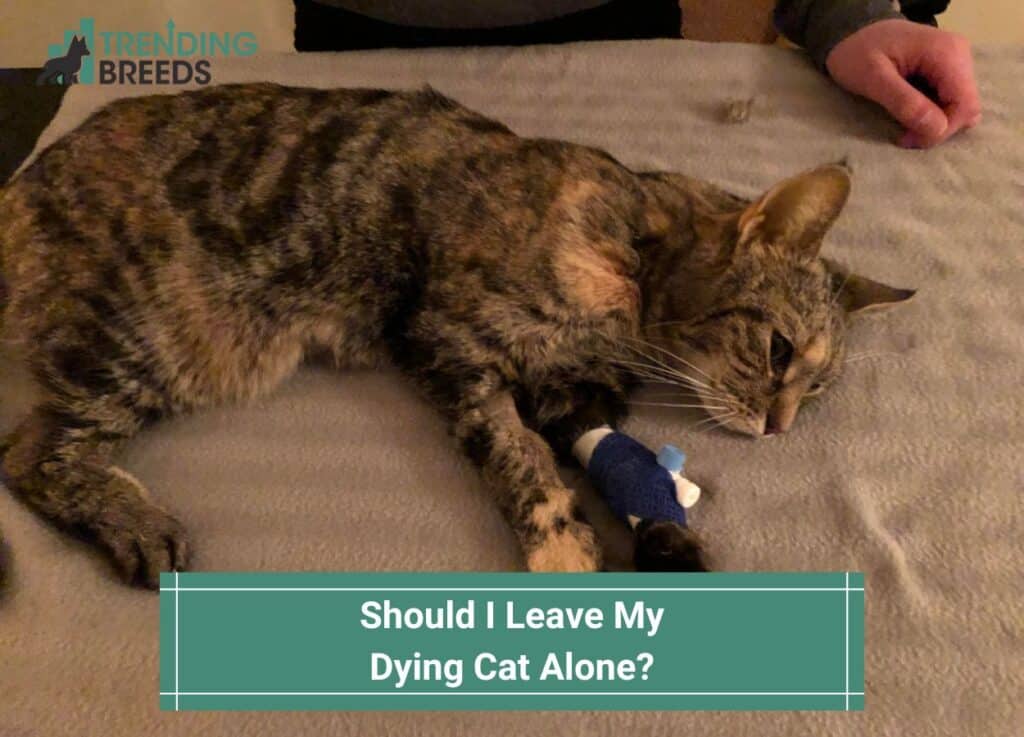
We’re sorry to hear that your cat is suffering from health issues. Cats, with their playful antics and purring affection, often become integral members of the family. When you have a dying cat, it can be difficult to decide on what to do. You might wonder, “Should I leave my dying cat alone?”
The answer is no.
Thus, when you are worried that they are dying, questioning whether you should leave them when they are dying alone can turn into quite a conundrum.
Before you scroll further down this guide, check out these other cat-related articles: When to Euthanize a Cat with Feline Leukemia? and What Is The Lethal Dose Of Benadryl For Cats?.
Should I Leave My Dying Cat Alone?
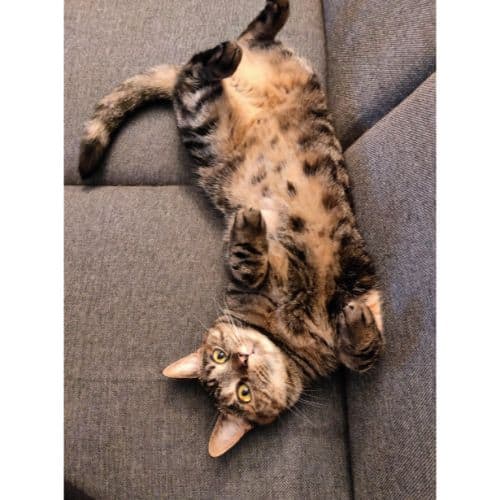
No, you should never leave your dying cat alone. Cats, like humans, have varied personalities and preferences.
Some may cherish solitude during their final moments, finding peace in their selves; however, most long for your familiar touch.
So, unless and until you have a cat that likes being left alone, you should never leave your pet alone, especially when they are dying.
What Does My Cat Want?
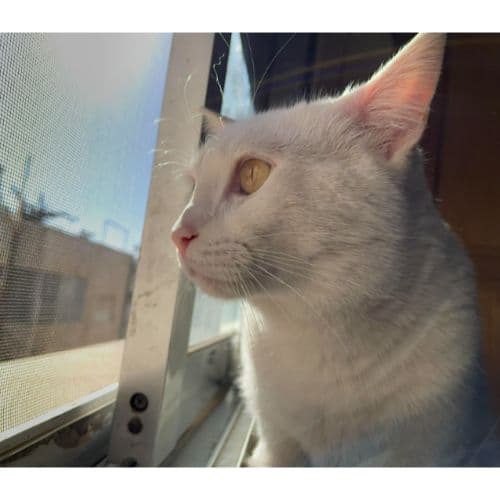
Understanding your cat’s needs, especially during this time, requires you to be empathetic and observant.
You’ve likely come to recognize some behaviors, quirks, and nuances exclusive to your pet. These cues can become invaluable now.
While some cats might convey their desire for solitude through their demeanor, others may start clinging closer, showing that they need you.
So, the key is to approach the situation with a more open heart, setting aside your feelings for a bit to tune into your cat’s.
How Do I Find Out That My Cat Needs Me?
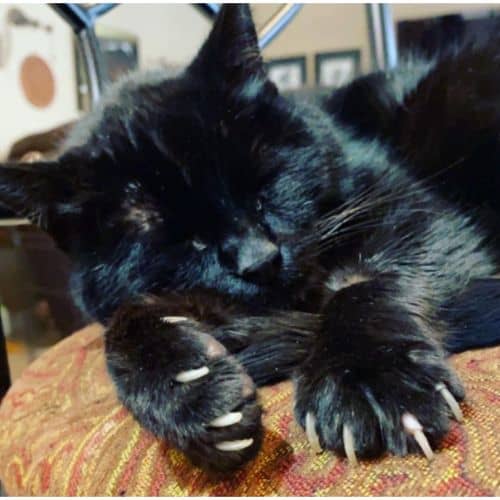
Cats are often considered as lonely creatures. But they form very deep connections with their humans.
As you go through the end, cats may show very different signs of needing company. Here’s a look at some of them:
- Purring: Cats often purr when in pain or distress. While this may initially be assumed as happiness, it may often be a sign that they are trying to comfort themselves or get you to help them.
- Nudging You: Just like a child, a soft paw or nudge might be your cat’s way of showing them that they require your presence.
- Staying With You: Cats are aloof creatures. They’re not constantly with you. In a weakened state, though, your cat might try to settle in your lap or stay close. If that’s the case, they’re yearning for you, and you should definitely keep your cat close.
Signs Your Cat Wants To Die Alone
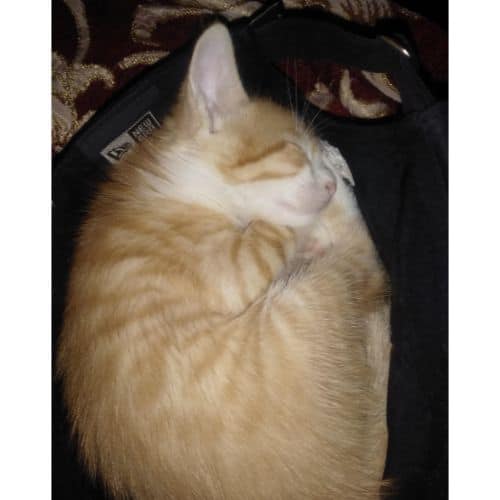
Some cats may be driven either by instinct or personal preference and may choose solitude in their final years. Here are a few signs that your cat desires solitude:
- They Find Isolated Spots: If your cats start retreating to isolated spots in the house, like under the bed or in a quiet corner, it might be their way of seeking peace.
- Avoiding Interaction: A noticeable decrease in responsiveness or avoiding touch can signal their preference for staying alone.
- Displaying Irritation: If you start comforting or approaching them, but they growling in response, grant them their space and circle back on them later.
Factors to Consider When Leaving A Dying Cat Alone
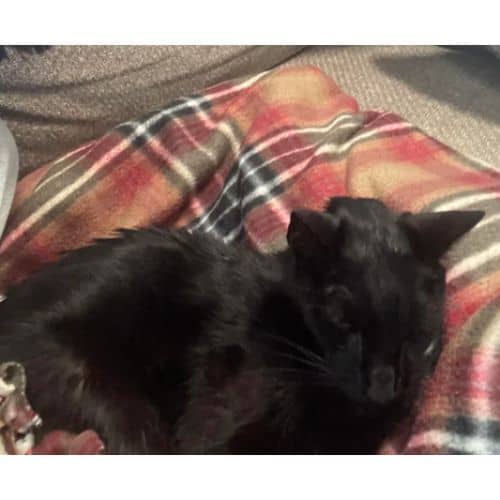
When you know your cat is dying, staying by their side or granting them solitude can be an extremely tough, if not an impossible, decision to make.
Here are some factors you should also consider:
The Cat’s Medical Conditions
Particular conditions may induce pain and alter a cat’s behavior towards you. If they are in pain, they will be more sensitive to touch and stimuli.
So, it is important to consult your vet and be aware of their medical state, adjusting your interactions with them accordingly.
Make sure to always talk to your vet to understand the intricacies of their condition.
Your Cat’s Personality
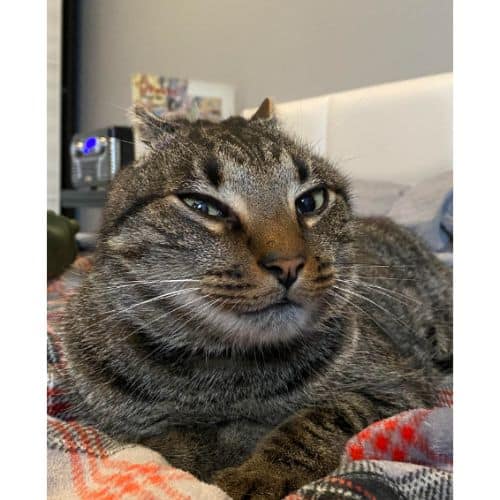
A cat that has been social for a long while will always crave human interaction and will be comfortable in your presence.
On the other hand, a cat that has always remained more independent or aloof may not be cuddling up with you.
Your Own Emotional State
In this pertinent time, your cat’s comfort is the most important. But, you shouldn’t also be neglecting your own feelings.
If witnessing their decline is too painful for you (which it naturally is), seek emotional support from loved ones or consider joining pet bereavement groups.
Your Environment and Surroundings

Ensure the environment that you are in helps with your and your cat’s comfort.
This can include a quiet space, a cozy blanket, and perhaps a favorite toy for your cat. Regardless, you need to ensure your cat is as comfortable as possible.
If you haven’t already, take a look at your house’s ambient temperature and make sure the room that your cat is residing in is as comfortable as possible.
Moreover, remove your food bowls and water bowls from high-up spaces and pay close care to their diet.
When a cat is healthy, they tend to do very well by themselves, and you don’t need to worry about whether they are fed or not if you have food out for them.
But, when your cat is sick, they tend to dissuade themselves from eating properly, so you need to pay close attention to their diet.
Plus, a calm and serene environment is very important. Make sure that there are no loud noises, interruptions, or other pets that might distress the dying cat.
A peaceful ambiance can make the entire process smoother.
How to Provide Comfort To Your Dying Cat
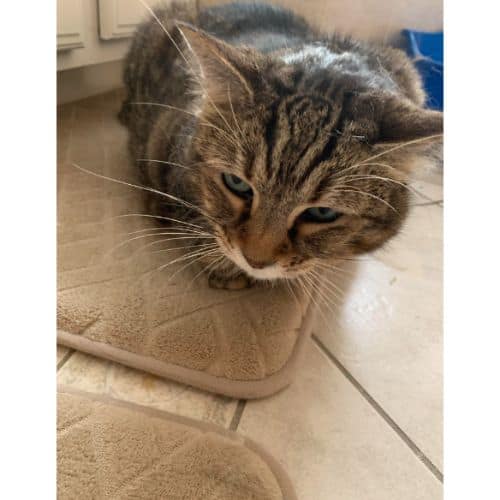
Whether your cat wishes to be left alone or not, ensuring your friend is at ease during their final moments is of great concern.
While every cat is unique, certain universal gestures act as a symbol of solace and serenity.
Create a Peaceful Environment
Just like humans, cats find solace in a peaceful, familiar environment. Soft lighting, their favorite blanket, or even familiar bedding can make them comfortable.
So, make sure that the items that they are used to are accessible to them at all times.
Familiar Sounds and Smells
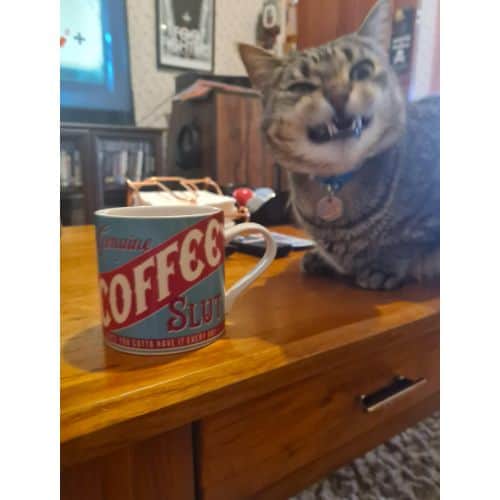
Cats have an excellent sense of smell and sound. Playing soft, calming music or even the familiar hum of a ceiling fan can make them feel at home.
Additional smells, such as their blanket or your scent, can also help them feel calm and relaxed.
We recommend placing an item of clothing that you wear near them as the familiar scent can make them feel like you are with them at all times.
If they end up cuddling near that clothing item, consider placing more of them and give them time as well.
Gentle Touch and Soft Words
For cats that wish to stay close to you, gently touching them can make them feel extremely soothed.
Soft strokes around their head and under their chin can feel quite comforting. Moreover, speaking in a gentle, hushed tone can also help calm a distressed cat down.
Sometimes, merely whispering words of love and comfort can make a world of difference for them as well.
Keep Them Hydrated and Fed
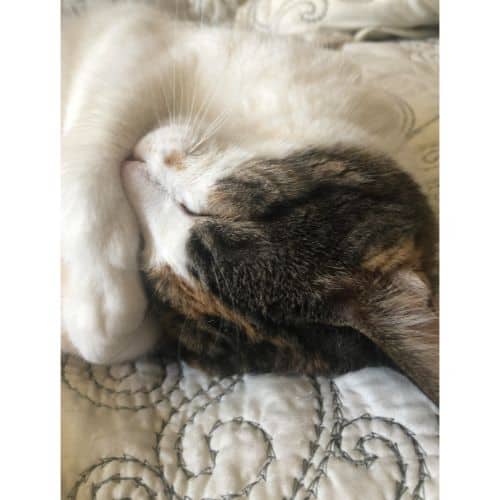
While it is quite common for dying cats to lose their appetite, ensure they always have access to fresh water.
If they are willing, offer them small portions of their treats or wet food directly from your hand.
Hydration is extremely important for your cat, as cats often stop drinking water when sick.
Seek Professional Advice
Your veterinarian is your primary resource for pain management and clinical care for your cat.
They will offer insight into your cat’s health and guide you on end-of-life care.
Their expert opinions can be particularly beneficial in understanding the nuances of your cat’s condition and also making sure they are as comfortable as possible.
For your own self, consider talking to pet therapists. They specialize in the bond between pets and their owners.
They will help you cope, provide emotional support, and also guide you through the grieving process.
We wholeheartedly recommend a consultation with them as they understand the pain of losing a pet.
Because of this, they lend a compassionate ear during these testing times.
Sharing your pain with others who’ve experienced similar losses can be therapeutic.
Bereavement groups offer a platform to share memories and solace in the collective experience.
Knowing you are not alone in your grief can also be a source of immense comfort.
What To Do After Your Cat Passes Away?
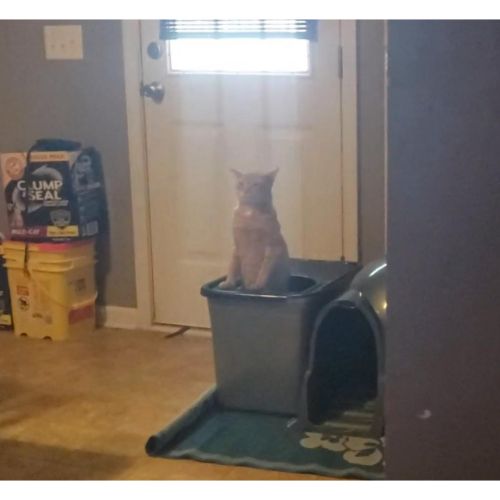
Cats, with their playful antics, unconditional love, and distinct personalities, leave inedible marks on our hearts.
If you have suffered this loss, here are some things you can do after your cat passes away:
Grieving is Natural
Allow yourself to mourn, to feel the depth of your emotions without judgment. Your grieving process, such as everyone else’s, is unique.
Some also may find solace in tears, while others might immerse themselves in work or activities.
There is no set timeline for grief. It is a personal journey for yourself that unfolds in its own time. Give yourself time and compassion to keep moving through.
Remember the Good Times
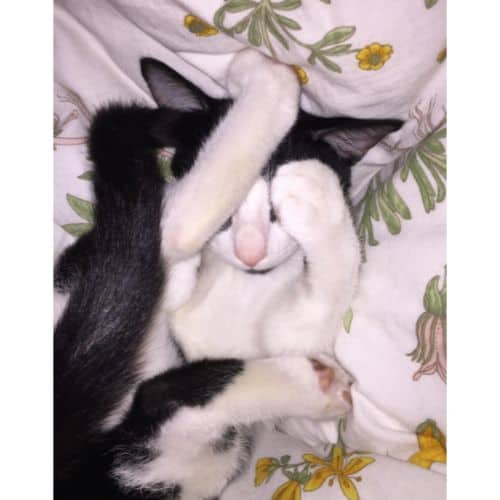
While the pain of your loss is sharp, celebrate your cat’s life by reminiscing about the joy they brought into your life.
Whether it is playful chases, gentle purring, or their occasional mischief, you should cherish these memories.
Some owners may also find comfort in creating scrapbooks, photo albums, or videos to remember their feline feline friends in the equation.
Start Seeking Support
As soon as your pet passes away, you should immediately start seeking support and letting your friends and family know.
It is important to lean on support systems during these times as well. Friends, family, or colleagues who’ve experienced similar losses can offer comfort, too.
Additionally, consider joining support groups or seeking therapy as well.
Professionals and fellow pet owners can also provide a safe space to express their feelings, share memories, and also to navigate the complexities of grief.
Do You Want To Leave Your Cat Alone or Accompanied?
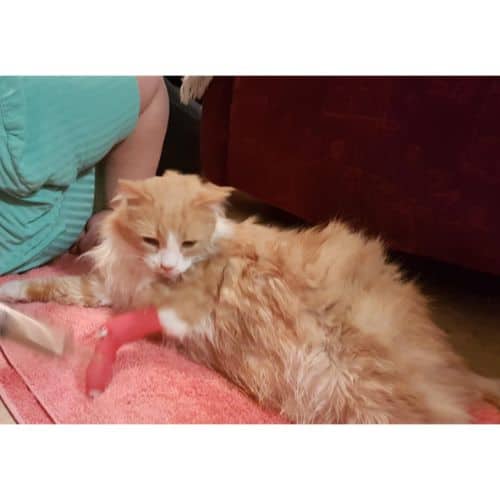
When the time comes, making the decision is an interplay with your cat’s cues and your emotional state.
Trust in the very intrinsic bond that you have shared with your care.
If you believe they will find comfort in your presence, offer them gentle strokes and soft-spoken words.
However, if they seem to prefer solitude as well, ensure that they’re comfortable and periodically check on them also.
Once again, remember that this is your own decision. It is up to you and your pet on what to decide.
Due to the deeply personal nature of this question, you should think about the decision and reflect on it before taking advice from your friends and family.
You should, however, consult your veterinarian and let your doctor know of your pet’s nature so they can also weigh in.
Should I Leave My Dying Cat Alone?
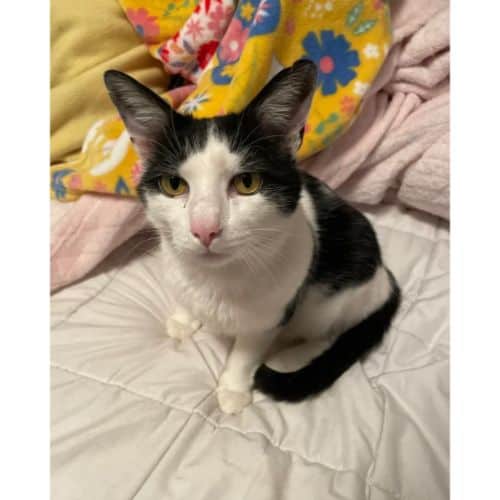
No, you shouldn’t leave your dying cat alone unless and until they show signs that they want to be left alone.
This is an extremely tough time for you and your family, too.
Therefore, try to seek as much help as possible and consult your veterinarian to stay up to date with your pet’s condition.
If you find this guide, “Should I Leave My Dying Cat Alone,” informative and helpful, you can check out these other cat-related articles from our team:
You can learn more about this topic by watching “How to Know if Your Cat Is Dying | Signs and Things to Do” down below:




